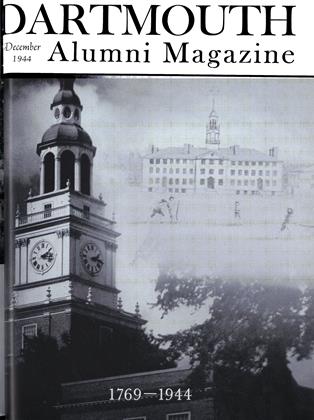Dartmouth Edges Brown for First Victory of the Season, Throws Scare Into Favored Yale Before Bowing, 6-0
IT is PLEASANT to continue the checkered saga of Dartmouth football in the fall of invasion year by reporting a victory. After the disappointing tie with Holy Cross, the decisive defeat by Penn, and the unmitigated pasting by Notre Dame, even a one-point victory over a none-too-powerful Brown team was sweet music to the tortured ears of the Green. This victory was particularly gratifying because, among other things, Dartmouth came from behind to win it. At the end of the first half, we were trailing on the short end of a 13-o score, having succeeded in amassing the depressing total of only two first downs as against six for the Browns. The latter spent the first two periods scampering up and down on the Dartmouth side of the 50-yard line, to the considerable dismay of the Green workers, who were, however, apparently unable to do much about it. The first half was, therefore, in the words of the Boston Post, "all Brown." But the second half was, to quote the rest of the aphorism coined by the same paper, "all Bonk."
This cryptic statement may require some explaining, which in an ordinary season would not be necessary for devoted followers of Dartmouth sports. But this year, I dare say, the readers of this column would be hard put to it to remember the names of more than a handful of the currently outstanding Green warriors, let alone try to follow the second team. Harry Bonk was, at the opening of the season, the second-string fullback. He was furthermore expected to keep his jersey reasonably clean because the incumbent in that position, the pile-driving Hal Clayton, was not calculated to need much rest and recuperation. But Clayton was badly hurt in early season scrimmage and the aforementioned Mr. Bonk had to inject his stocky 195 pounds into the breach. He performed ably in the Penn game and did the best anyone could do against the man-killing Notre Dame line. But Harry really came into his own in the second half of the Brown game which was, by the curious irony of this season, also his last for Dartmouth. He left immediately after the game to report to Bucknell, where he presumably more than counterbalanced the players which Dartmouth subsequently received from that institution.
The first time they were able to clutch the coveted pigskin in the second half, the Green started to roll. Bonk began his field day by ripping large holes in first one side and then the other of a wilting Brown line. He carried the ball a total of 40 yards in four plunges, which is a respectable average in any league. His work culminated on the two-yard line, whence Guadalcanal Dick Bennett took it over for the first Dartmouth touchdown of the game and the third of the season. Later on, Bonk again took personal control of the encounter, as Dartmouth started to march from their own 30-yard line. With Dick Bennett occasionally spelling him, Bonk carried the ball down the field in a series of plays which culminated in a 28-yard dash for a touchdown in the fourth period. Britt Lewis distinguished himself by accurately booting two points after touchdown, the second of Xvhich spelled the difference between victory and defeat for Dartmouth in this 31st encounter between two old and friendly rivals. The score in that series of encounters, incidentally, now stands at 18 victories for Dartmouth, 11 for Brown, and two scoreless ties. In this game, it was a clear case of every loyal Dartmouth man being wild about Harry.
 View Full Issue
View Full Issue
More From This Issue
-
 Article
ArticleTHE FOUNDING FAITH
December 1944 By EARL CRANSTON '16, PHILLIPS PROFESSOR OF RELIGION -
 Article
ArticleTHE FIRST 175 YEARS
December 1944 -
 Lettter from the Editor
Lettter from the Editor'Round the Girdled Earth
December 1944 By H. F. W. -
 Class Notes
Class Notes1934
December 1944 By WILLIAM C. EMBRY -
 Class Notes
Class Notes1945
December 1944 By ARTHUR NICHOLS -
 Article
ArticleDARTMOUTH'S CHARTER
December 1944
Francis E. Merrill '26
-
 Sports
SportsMISCELLANY
March 1947 By Francis E. Merrill '26 -
 Sports
SportsSWIMMING
January 1949 By Francis E. Merrill '26 -
 Sports
SportsTRACK
February 1950 By Francis E. Merrill '26 -
 Sports
SportsWith Big Green Teams
March 1951 By FRANCIS E. MERRILL '26 -
 Sports
SportsSquash
April 1951 By Francis E. Merrill '26 -
 Article
ArticleResults to Date
January 1952 By FRANCIS E. MERRILL '26
Sports
-
 Sports
Sports1950 Football Schedule
December 1949 -
 SPORTS
SPORTSSpring Swing
MARCH/APRIL 2023 -
 Sports
SportsHarriers Second In Nation
FEBRUARY • 1988 By -Jim Sapienza '85 -
 Sports
SportsCourt Complement
JAN./FEB. 1980 By Brad Hills '65 -
 Sports
SportsGREEN DROPS COURT FINAL
May 1944 By C. B. Arthur '34 -
 Sports
SportsLOOKING AHEAD
April 1944 By C. E. W.

